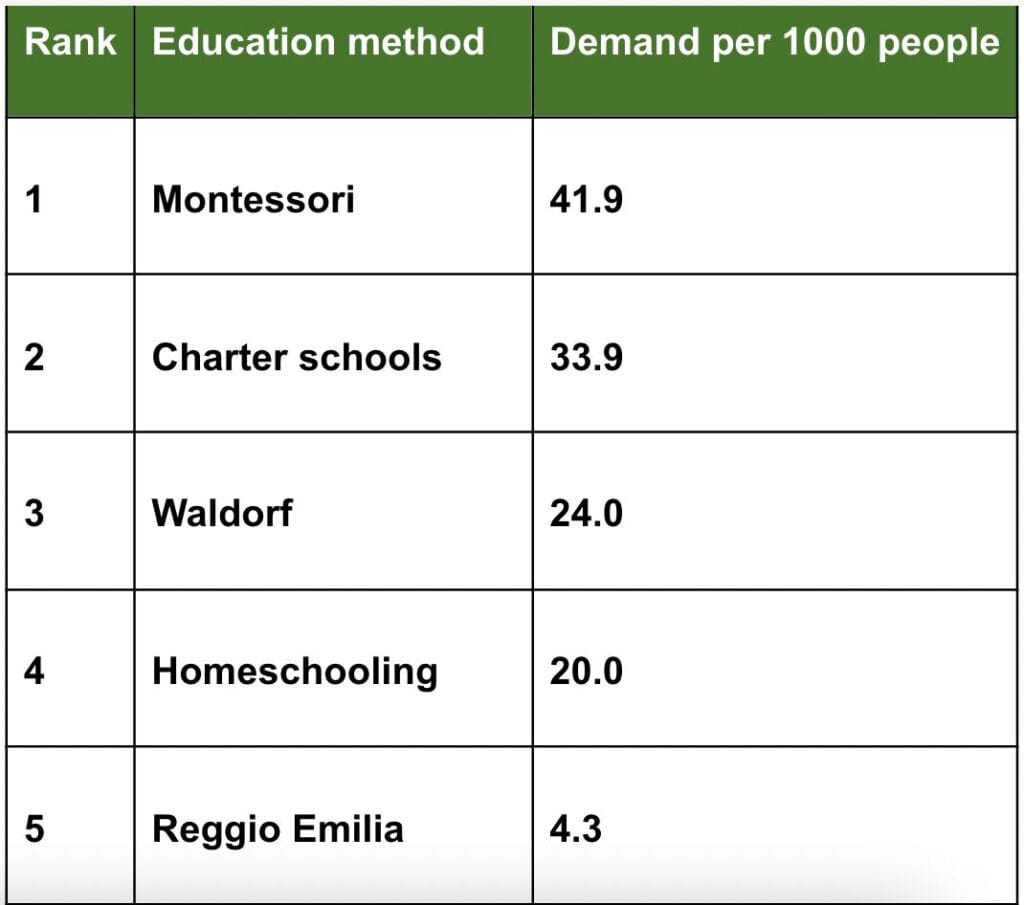Every child is different, and often a mainstream education philosophy isn’t always suited as a “one size fits all” pathway. There are many different alternative education philosophies, with varying degrees of popularity and uptake across America, and different cultures across the world. A recent study revealed that when it comes to Arizona’s favored education method, Montessori comes out at No. 1.
New research by education experts, Witherow Brooke examines seven alternative education philosophies’ popularity across U.S. states by analyzing Google search volumes, proportioned against population size.
The philosophies studied were:
- Montessori
- Waldorf & Steiner
- Reggio Emilia
- Homeschooling
- Unschooling
- Charter schools
- Democratic schools
Montessori was the most in-demand philosophy in Arizona
The most popular philosophy in Arizona was Montessori. On average there were 41.9 searches for Montessori schools and methods for every 1000 Arizonians. Montessori education, pioneered by Maria Montessori, emphasizes self-directed learning and collaborative play in carefully prepared environments, fostering independence, exploration and holistic development.
27 states had Montessori as the highest number of searches per population, including Colorado, Georgia, Illinois and Vermont.
Vermont had the highest amount of searches, with 77.4 for every 1000 people. The lowest overall for Montessori was in Mississippi, which had the least demand for the education philosophy with only 23.1 searches for every 1000 people.
Ranked: Arizona’s most popular alternative education philosophies

Charter schools and Waldorf methods come in second and third
Charter schools are publicly funded and operate independently of traditional districts, offering more curriculum, teaching and policy flexibility. They may specialize in areas like STEM or the arts, and parents choose them for reasons like dissatisfaction with traditional schools or seeking specialized education options.
Searches for Charter school information was the second most popular in Arizona, with 33.9 searches for every 1000 people.
Waldorf education, founded by Rudolf Steiner, prioritizes holistic development, creativity, and practical skills integration, fostering imagination, nature connection and emotional-social growth, making it appealing to parents seeking a well-rounded educational approach.
Waldorf was Arizona’s third most-searched education method, with 24 searches per 1000 people.
Waldorf methods have huge popularity across the world — it was the most searched philosophy in the United Kingdom overall. However, in the U.S. only four states had Waldorf as their most searched education practice.
These were: Hawaii, Nevada, North Dakota and Virginia. Nevada had 70.7 searches for every 1000 people around the Waldorf & Steiner philosophy, more than triple the amount of Indiana, which was one of the lowest demand for these methods — with only 17.4 searches per 1000 people.
54% of states favor Montessori methods overall
In the U.S., Montessori education emerges as the most sought-after philosophy, with 27 states showing the highest search volume per population, underscoring a national trend towards self-directed learning and holistic development. Homeschooling and charter schools follow closely, with 10 states favoring homeschooling and nine states leaning towards charter schools for their flexibility and specialized approaches.
States such as Alaska, Kentucky, Tennessee and West Virginia were included in who had the highest demand for homeschooling over other education practices or methods.
However, homeschooling was not as popular in every state. In New Jersey, there were only 14.5 searches around it for every 1000 people — the lowest in the study overall. Also not favoring homeschooling as much were parents or caregivers in Pennsylvania and California, with only 15.4 and 16.3 searches respectively.
Meanwhile, Waldorf methods, although globally popular, attract interest in only 4 states, while Reggio Emilia sees a notable rise in search trends across 11 states, signifying a growing appreciation for child-directed learning and creative environments nationwide.
Roland Witherow, Co-Founder of Witherow Brooke and education expert commented, “The dominance of Montessori across the majority of states underscores a growing demand for individualized learning and experiential approaches. Concurrently, the popularity of homeschooling and charter schools highlights a quest for flexibility and tailored instruction.”
Witherow adds, “While Waldorf methodologies enjoy global recognition, their relatively subdued presence in the U.S. indicates a unique inclination towards pragmatic skill integration and holistic development among American parents. Moreover, the noteworthy uptick in interest towards Reggio Emilia signifies an evolving appreciation for child-centered pedagogy and collaborative environments. These findings not only enrich our understanding of alternative education but also serve as invaluable guidance for educators, policymakers and parents navigating the diverse educational landscape in the United States.”
You can view the study, which also looks at the most popular methods in the U.K., Australia, Canada and the UAE by visiting here.




